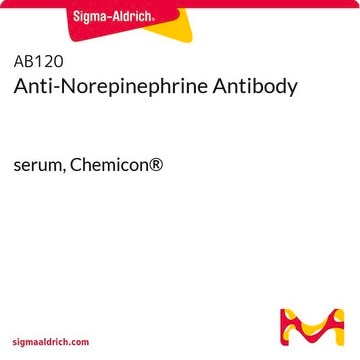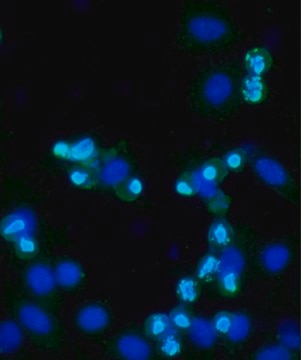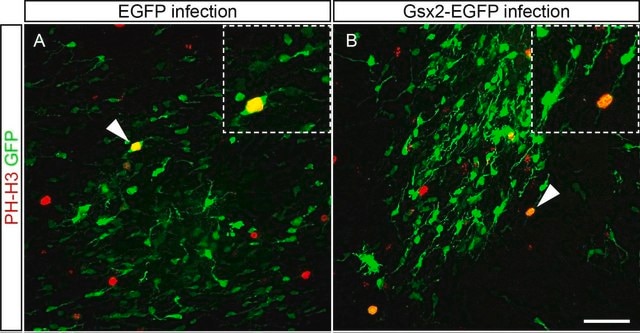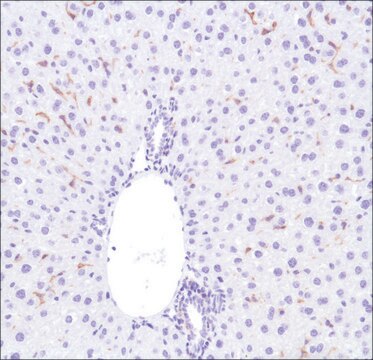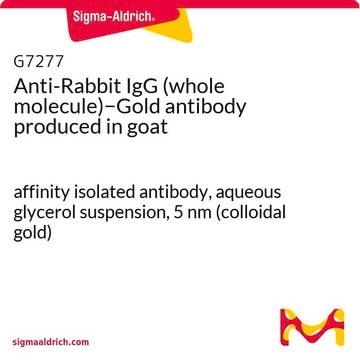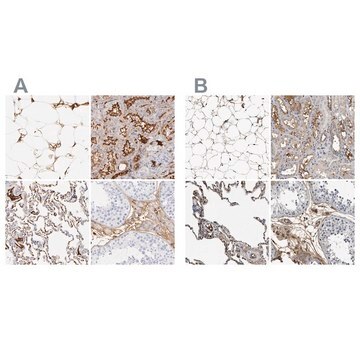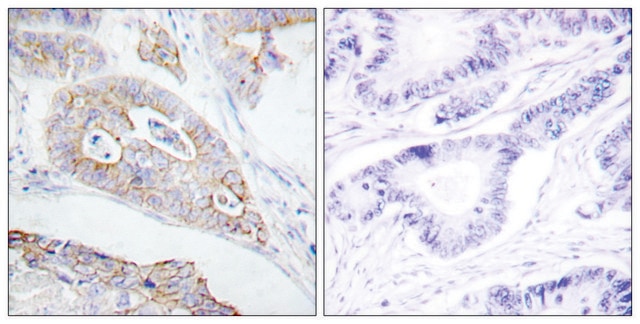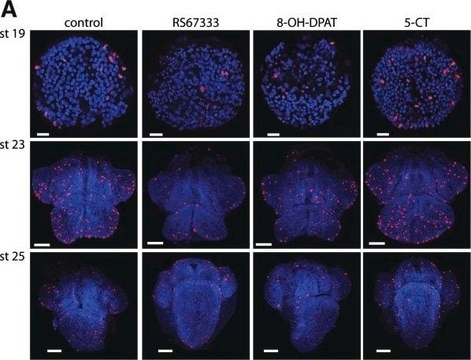HTS004M
ChemiSCREEN CXCR4 Membrane Preparation
Human CXCR4 GPCR membrane preparation for Radioligand binding Assays & GTPgammaS binding.
Sign Into View Organizational & Contract Pricing
All Photos(2)
About This Item
UNSPSC Code:
41106514
eCl@ss:
32161000
NACRES:
NA.84
Recommended Products
biological source
human
Quality Level
recombinant
expressed in Chem-1 cells
packaging
pkg of 2 mL
manufacturer/tradename
ChemiScreen
Chemicon®
concentration
0.5 mg/mL
technique(s)
ligand binding assay: suitable (GTPγS)
radioligand binding assay (RLBA): suitable
NCBI accession no.
UniProt accession no.
shipped in
dry ice
Gene Information
human ... CXCR4(7852)
General description
Full-length human CXCR4 cDNA
The chemokine SDF-1a and its GPCR receptor CXCR4 have a one-to-one specificity that is unique among chemokines and their receptors. SDF-1a binds to CXCR4 expressed on hematopoietic and lymphopoietic cells, and directs their trafficking to and retention in hemato-and lymphatopoietic organs and sites of inflammation (Kucia et al., 2004). CXCR4 is expressed on several tumor cell lineages, and might be responsible for metastasis to sites of SDF-1a expression, such as bone and lymph nodes (Muller et al., 2001). In addition, CXCR4 is a coreceptor for the HIV envelope glycoprotein gp120 (Feng et al., 1996). Small molecule antagonists of CXCR4 have been developed and shown to inhibit infectivity of T-tropic HIV strains and to impair growth of brain tumors (Arakaki et al., 1999; Rubin et al., 2003). Chemicon′s CXCR4 membrane preparations are crude membrane preparations made from our proprietary stable recombinant cell lines to ensure high-level of GPCR surface expression; thus, they are ideal tools for screening for antagonists of interactions between CXCR4 and SDF-1a. Radiolabeled SDF-1a binds to the CXCR4 membranes with a Kd of 0.9 nM. With 0.04-0.13 nM 125I-labeled SDF-1a, an approximately 3-fold window of specific binding is obtained.
Application
Radioligand binding assay and GTPgammaS binding.
Biochem/physiol Actions
Protein Target: CXCR4
Quality
Table 1. Signal:background and specific binding values obtained in a competition binding assay with CXCR4 membrane prep, 0.13 nM 125I-SDF-1α and a dilution series of unlabeled SDF-1α.
| 5 µg/well | |
|---|---|
| Signal:Background | 4.9 |
| Specific Binding (cpm) | 9004 |
Specifications:
1 unit = 5 μg
Bmax [125I]-SDF-1alpha binding: 1.6 pmol/mg protein
Kd for [125I] SDF-1alpha binding: ~ 0.9 nM
Specifications
Inucbation Conditions
RECOMMENDED ASSAY CONDITIONS: Membranes are mixed with radioactive ligand and unlabeled competitor (see Figures 1 and 2 for concentrations tested) in binding buffer in a nonbinding 96-well plate, and incubated for 1-2 h. Prior to filtration, a GF/C 96-well filter plate is coated with 0.33% polyethyleneimine for 30 min, then washed with 50 mM HEPES, pH 7.4, 0.5% BSA. Binding reaction is transferred to the filter plate, and washed 3 times (1 mL per well per wash) with Wash Buffer. The plate is dried and counted.
Binding buffer: 50 mM Hepes, pH 7.4, 5 mM MgCl2, 1 mM CaCl2, 0.2% BSA, filtered and stored at 4°C
Radioligand: [125I] SDF-1alpha (PerkinElmer#: NEX346)
Wash Buffer: 50 mM Hepes, pH 7.4, 500 mM NaCl , 0.1% BSA, filtered and stored at 4°C.
One vial contains enough membranes for at least 200 assays (units), where an unit is the amount of membrane that will yield greater than 4-fold signal:background with 125I-labeled SDF-1alpha at 0.13 nM.
RECOMMENDED ASSAY CONDITIONS: Membranes are mixed with radioactive ligand and unlabeled competitor (see Figures 1 and 2 for concentrations tested) in binding buffer in a nonbinding 96-well plate, and incubated for 1-2 h. Prior to filtration, a GF/C 96-well filter plate is coated with 0.33% polyethyleneimine for 30 min, then washed with 50 mM HEPES, pH 7.4, 0.5% BSA. Binding reaction is transferred to the filter plate, and washed 3 times (1 mL per well per wash) with Wash Buffer. The plate is dried and counted.
Binding buffer: 50 mM Hepes, pH 7.4, 5 mM MgCl2, 1 mM CaCl2, 0.2% BSA, filtered and stored at 4°C
Radioligand: [125I] SDF-1alpha (PerkinElmer#: NEX346)
Wash Buffer: 50 mM Hepes, pH 7.4, 500 mM NaCl , 0.1% BSA, filtered and stored at 4°C.
One vial contains enough membranes for at least 200 assays (units), where an unit is the amount of membrane that will yield greater than 4-fold signal:background with 125I-labeled SDF-1alpha at 0.13 nM.
Physical form
Packaging buffer: 50 mM Tris pH 7.4, 10% glycerol and 1% BSA
Packaging method: Membranes protein were adjusted to 0.5 mg/ml in 1 ml packaging buffer, rapidly frozen, and stored at -80°C.
Packaging method: Membranes protein were adjusted to 0.5 mg/ml in 1 ml packaging buffer, rapidly frozen, and stored at -80°C.
Legal Information
CHEMICON is a registered trademark of Merck KGaA, Darmstadt, Germany
wgk_germany
WGK 2
flash_point_f
Not applicable
flash_point_c
Not applicable
Certificates of Analysis (COA)
Search for Certificates of Analysis (COA) by entering the products Lot/Batch Number. Lot and Batch Numbers can be found on a product’s label following the words ‘Lot’ or ‘Batch’.
Already Own This Product?
Find documentation for the products that you have recently purchased in the Document Library.
Y Feng et al.
Science (New York, N.Y.), 272(5263), 872-877 (1996-05-10)
A cofactor for HIV-1 (human immunodeficiency virus-type 1) fusion and entry was identified with the use of a novel functional complementary DNA (cDNA) cloning strategy. This protein, designated "fusin," is a putative G protein-coupled receptor with seven transmembrane segments. Recombinant
Our team of scientists has experience in all areas of research including Life Science, Material Science, Chemical Synthesis, Chromatography, Analytical and many others.
Contact Technical Service
